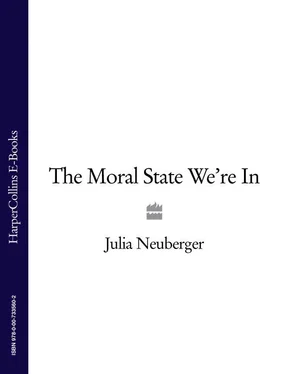The people who are currently performing the most intimate tasks for the patients, most of whom are old, are the care assistants. However, they do not have the status to allow them to tell relatives and social workers what is worrying a patient. It used to be said that the people who knew most about what patients were really feeling were not the nurses at all but the cleaning staff, who would chat to patients while they mopped round their beds. The gradual contracting-out of cleaning services has removed even this degree of contact. The people who are left to hear the patients’ stories are very often the care assistants. Yet many of them are largely untrained. National Vocational Qualifications are increasingly common, and many hospitals, care homes, and nursing homes encourage their care assistants to take those exams. But not all hospitals pay for the training or allow staff time off, and many do not offer more pay when a qualification has been gained. If care assistants were actively encouraged to study for NVQs and then, where appropriate, to move on to more advanced qualifications, the whole atmosphere might change. Care assistants would then be seen as embryonic nurses rather than skivvies. Though this happens to some extent with the skills ladder the NHS has in place, there seems to be a remarkable amount of resistance to letting people through the various ‘glass ceilings’ and allowing them to move from care assistant to nurse, and from nurse to manager.
Transferring such a scenario into the main care sector for older people, nursing homes and care homes, where there will probably be only one qualified nurse on duty, would similarly have a transformative effect on care assistants. They would no longer be seen as short-term employees doing dirty work for little money and no emotional and ‘respect’ reward, but people who may go into nursing eventually or who may choose to remain as care assistants, at the top of that particular tree, with all its attendant qualifications and respect. The government has set itself the target of half of all care home staff having reached NVQ level 2 by the year 2005. It is pretty unlikely that the target will be reached, but the government’s intentions are good, and grants given to care home owners to help them pay for courses and study leave would speed up the process. It is, after all, well attested that training care home staff can reduce the amount of abuse, both intentional and unintentional, quite considerably.
Providing that hands-on, day-to-day care is hard work and can lead to stress and frustration. It is no surprise that nurses, who cost the system a lot to train, do not want to wipe bottoms and change beds, or feed patients or help them wash. Until care assistants have real status, recognizing them as the people who actually provide this vital and difficult hands-on care, they will not–as a group–necessarily give of their best. Until they are trained properly and achieve professional recognition there will always be the risk of deficient care, even abuse, from care assistants who have no vocation or professional dedication and who have only taken on the job because they can get no other work.
Example after example of poor care, often not abusive as such but insensitive and uncaring, emerges from CHI reports, from local newspapers, and from anecdotes from friends and relatives. And these must be just the tip of the iceberg. Typical is the case of a nursing home in East London which had a complaint against it upheld by the National Care Standards Commission because of the ‘unprofessional’ attitude shown towards a lady just minutes after her relative’s death. Care workers did not sympathize or help her come to terms with the news of her relative’s unexpected death (she had already complained about unexplained bruising on his arm). Instead, she was told that ‘there was not much point’ in an undertaker taking his body away that night because of the extra cost (of after-hours collection, presumably) and was told that his body would have to remain in the room he was sharing with another man–a piece of insensitivity about the effect on the other man which beggars belief. *
Insensitivity and uncaring attitudes. Yet something can be done about them, and care staff can be trained and encouraged to think differently, if employers make it worth their while. Care assistants should know that the ladder into nursing is available to them. Nurses, and their organizations, should celebrate the contribution care assistants make and welcome those who climb the ladder into nursing to join them. There has to be another way into nursing that does not require a university degree, and there has to be recognition that caring is of equal status with providing hi-tech interventions. Equally, care assistants will have to accept that they will be regulated and checked by the police for any record of abuse and that they will be expected to work in a care home or nursing home for a considerable period, rather than hopping from one agency to another.
These would be major changes. Care assistants have been appallingly badly treated. We have allowed our most vulnerable older people to be cared for by people to whom we do not show respect. The challenge is to pay care assistants properly, train them properly, and support them properly without the cost of care becoming so prohibitive that no one can afford it. Yet without this the existing situation will get worse. As Janet Street-Porter argued fiercely in her article entitled ‘I’ll do anything except go into a care home’: ‘The whole culture of care for the elderly gives me cause for concern. If we don’t value teachers, we insult carers. The pay is appalling, the job unattractive, the prospects pathetic.’ *Quite so. And it is our fault.
The fact that we think it acceptable to put our old people into care homes at all is another issue that needs consideration. Yasmin Alibhai-Brown, redoubtable campaigner on race issues and doughty journalist, wrote a piece in Community Care back in 1998 † about her mother, arguing that ‘the worst luck in this country is to be alive when old’. She said it even more strongly after the death of the only other Asian resident in the housing association block in Ealing, where she lives. Mrs Pal fell before she died and had to go into residential care. All the residents were Asian, and they sat ‘silently, eyes unseeing, as if they had already passed away’. Mrs Pal died after two weeks of this, and Yasmin Alibhai-Brown’s mother will not forgive her son for putting her there, nor ‘this society for the way it treats old people so that they feel they have to oblige us by dying’.
Regulation of Care Homes and Nursing Homes
The issue of care assistants, and how we value and reward them is one illustration of where we have got it wrong with regard to who most deserves respect in our society. Another area that has impacted heavily on older people has been in the attempts by government to make a difference to older people’s welfare, encouraged to some considerable extent by the two main organizations representing the interests of older people, Help the Aged and Age Concern. This has resulted in regulations requiring certain standards of provision within care and nursing homes, particularly the size of rooms.
Of course, this was all very well intentioned. There were many homes in which people were crammed two, three, and four together into one not very large room. The idea that older people should share rooms in nursing and care homes is itself surprising, given that few of us share rooms with anyone other than spouses and partners at any other stage of our lives, except in childhood. There had, of course, been scandals surrounding care home owners trying to make additional money out of cramming people in, so it is hardly surprising that Help the Aged, itself formerly a provider of nursing and care home accommodation, and Age Concern should have raised this as a matter of concern. The desire to keep prices down-understandable though it may be-should not allow local authorities to get away with paying substandard fees for substandard accommodation. But the problem is that size of rooms, and facilities such as private bathrooms, important though they might be, are not all that is needed, and many smaller care and nursing homes have closed because the costs of alterations required, and the complexities of providing accommodation for residents whilst work was being carried out, were just too much. It is of course desirable that everyone should have their own room. Most of us would contemplate nothing less. It is equally desirable for everyone to have their own bathroom. But there are two major factors that those who drafted the regulations, and those who campaigned for them, did not fully consider. The first is that for many confused older people, being confined to their own rooms all day does not provide the stimulation they might need, nor will it delay the deterioration process. They need company and activity–the social buzz that being on their own watching a television in their room cannot provide. Secondly, though many of the older care homes were not up to modern standards, some of them provided a personal quality of care that was of infinitely greater importance than a room of one’s own, particularly for those who were confused and frightened. In all this, there has been a confusion between physical standards–space and the need for basic privacy–and the quality of care. Though better accommodation is undoubtedly desirable, tender care, with well supervised and well supported care assistants, has an enormous amount to recommend it. Yet again, our desire to regulate takes precedence over what really matters: the quality of care. Old-fashioned premises where the staff are well supervised and truly committed to what they do might well be preferable to a spanking new facility, gleaming bright, but with no soul. You cannot legislate for soul. But you can make palliative care more available to many older people.
Читать дальше






![Nicholas Timmins - The Five Giants [New Edition] - A Biography of the Welfare State](/books/701739/nicholas-timmins-the-five-giants-new-edition-a-thumb.webp)





